-

人教版新目标初中英语九年级下册Rainy days make me sad教案
1. 教材分析本单元以how do things affect you?为话题, 从颜色、天气、音乐、广告、产品等方面谈论了外界事物如何影响人的心情。要求学生掌握表达某物或某事给人带来的感觉、看法或影响等。共设计了四个部分的内容:Section A 该部分有4个模块:第一模块围绕Which restaurant would you like to go to?这一话题展开思维(1a)、听力(1b)、口语(1c)训练;第二模块围绕How does music affect you? 进行听力(2a-2b)、口语训练(2c);第三模块继续围绕how do colors in the restaurant affect you这一话题展开训练,训练形式为阅读和问题体验(3a)和小组活动(3b);第四模块仍就How do things affect you这一话题以调查的形式展开讨论。Section B该部分有4个模块:第一模块围绕产品广告对人们的影响这一话题以“配对”(1a)与“列举”(1b)两种形式展开训练;第二模块继续围绕How do things affect you? 进行听力(2a-2b)、口语对话训练(2c);第三模块围绕“Advertising”这一话题展开阅读(3a-3b)和写作(3c)训练;第四模块围绕How posters affect you这一话题以口语训练形式展开小组活动。

人教版新目标初中英语九年级下册I’ll help clean up the city parks教案
Talk about offering help (P60)I’ll help clean up the city parks.A: I’d like to work ...B: You could help ...Talk about ways to tell people about the Clean-Up Day (P61)We need to ...We can’t ...I’ll ...Talk about the work the volunteers do (P62)These three students all volunteer their time to help other people.Somebody loves to ... / helps ... / plans to ... / wants to ...A: What do you like doing?B: I like ... A: What kind of volunteer work do you think I could do?B: You could ...1. 重点词汇advertisement, fix, repair, pleasure, blind, deaf, shut, carry, specially, fetch2. 认读词汇hunger, homeless, cheer, clean-up, sign, establish, major, commitment, elementary, veterinarian, coach, similar, call-in, strategy, disabled, organization, unable, support, appreciate, donation, part of speech, pronoun, adverb, preposition, conjunction, donate, Jimmy, Sally3. 词组clean up, cheer up, give out, put off, set up, think up, take after, fix up, give away, put up, hand out, work out, at once

人教版新目标初中英语九年级下册We’re trying to save the manatees教案2篇
本单元主要围绕着有关濒临灭绝的动物这一话题,学习了应该怎样保护我们的环境,以及就某一问题展开辩论。目标提示语言目标能够运用所学知识,就某一问题展开辩论。认知目标1、复习一些语法:现在进行时、一般现在时、用used to 表示一般过去时、现在完成时、一般过去时的被动语态。2、学会表达同意和不同意。3、学会以下基本句型:We’re trying to save the manatees.Manatees eat about 100 pounds of food a day.There used to be a lot of manatees.In 1972,it was discovered that they were endangered.Some of the swamps have become polluted.情感目标了解一些濒临灭绝的动物的生活习性和濒临灭绝的原因,教育学生应该如何保护环境。教学提示充分利用多媒体等教学设备,创设与本课话题相关的情境,如各种不同种类的动物、动物园以及有关环境的画画等等。围绕着本单元的教学目标,设计一些贴近学生实际的教学任务,如让学生谈论自己最喜欢的动物,如何拯救濒危动物,如何保护环境等等。让学生根据所学知识,就动物园是否对动物有利以及其他的话题进行辩论。
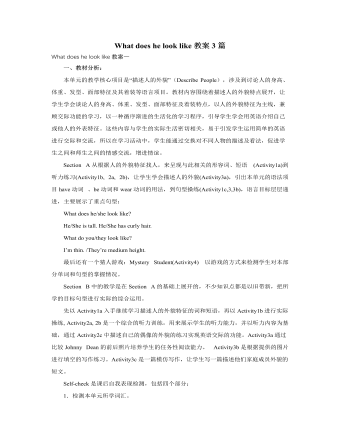
人教版新目标初中英语七年级下册What does he look like教案3篇
所需要用到的句子:Who is that?That is Jack. I like him.Why do you like him?I like him because he is interesting.Task 4: 设计理想中的人类Step one: 设计理想中的人类的外貌。把全班同学分成若干小组,学生可以边说边在纸上画出他们的模样。Step two: 设计理想中人类的性格。学生们可以把那些能描述性格的单词写在图画的旁边。Step three: 每组选出一名同学,其他同组同学提问,他作简单回答,并说明原因。所需用到的句子:What does he or she look like?He or she ...What is he or she like?He or she is ...Why?Because ...Task 5: 挑战性活动调查性格是天生的还是后天形成的,让每个同学回家去调查一下自己成长过程中性格是否有变化,具体是怎样的,为什么会这样? Teaching Aims:1. Enable students to have a general understanding of how to talk about people's physical appearance.2. Enable students to tackle some essential vocabularies and patterns about describing people. Provide them with necessary skills and methods.3. Create various chances for students to describe the persons they're familiar with, such as classmates, family members, teachers, idols, etc.

人教版新目标初中英语七年级下册Where is the post office教案2篇
Period 2 (3a----Section B 2c)Preview(Pre-task): Key points: What laAdd another information about their pen pals----their language on the cardnguage does she/he speak?She/He speaks....Does she/he have any brothers and sisters? Does she/he speak English?Preview(Pre-task): Add another information about their pen pals----their language on the cardKey points: What language does she/he speak?She/He speaks....Does she/he have any brothers and sisters? Does she/he speak English?Step 1 Revision1.Revisionand dictation of the new words 2.Revise the drills they learned yesterday.(by pairwork and grammar exercise)Step 2 Leading-inT has a conversation with one student. The conversation is following:---Do you have a pen pal?---Yes, I do.---What's your pen pal's name? ---His/Her name is....---Where is your pen pal from? ---He/She is from...---Where does he/she live? ---He/She lives in....---What language does he/she speak?He/She speaks...Write the new words on the Bb. They are following: EnglishChineseJapaneseFrenchStep 3 LearnLearn the new words with the whole class.Finish 3a with the students3b Pairwork T still does an example with one student Then the Ss practise in pairs. The example is following:--Curry Muray is my pen pal. He is from the United States.---What language does he speak?
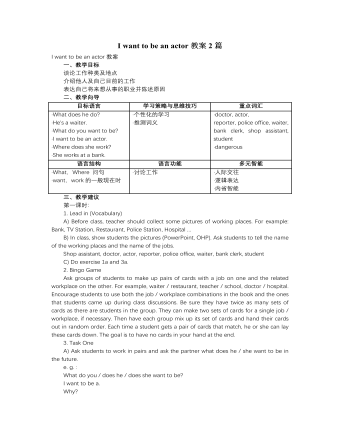
人教版新目标初中英语七年级下册I want to be an actor教案2篇
三、教学建议第一课时:1. Lead in (Vocabulary)A) Before class, teacher should collect some pictures of working places. For example: Bank, TV Station, Restaurant, Police Station, Hospital ...B) In class, show students the pictures (PowerPoint, OHP). Ask students to tell the name of the working places and the name of the jobs.Shop assistant, doctor, actor, reporter, police office, waiter, bank clerk, studentC) Do exercise 1a and 3a.2. Bingo GameAsk groups of students to make up pairs of cards with a job on one and the related workplace on the other. For example, waiter / restaurant, teacher / school, doctor / hospital. Encourage students to use both the job / workplace combinations in the book and the ones that students came up during class discussions. Be sure they have twice as many sets of cards as there are students in the group. They can make two sets of cards for a single job / workplace, if necessary. Then have each group mix up its set of cards and hand their cards out in random order. Each time a student gets a pair of cards that match, he or she can lay these cards down. The goal is to have no cards in your hand at the end.3. Task OneA) Ask students to work in pairs and ask the partner what does he / she want to be in the future.e. g. :What do you / does he / does she want to be?I want to be a.Why?Because it's (adj).B) Vocabulary: Section B, 1a4. Homework 1.2.
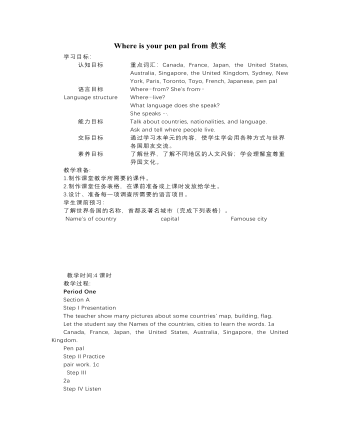
人教版新目标初中英语七年级下册Where is your pen pal from教案
2.1Match the country with the language.Step II Reading3a? let the students read the letter fast and answer the questions.? Let the students ask more questions about the letter as possible as the can.Step III Writing3b.Step IV. Pairwork2cStep V Listening2a, 2bStep V. HomeworkExercises book(1) P3Exercises book (2) P3Period FourStep I . Dictate the words and sentences in Unit1.Step II. Self-checkStep III. Check the answers for Exercises book in the unit.Step IV. Home workRevise and preparation for unit 2.教学反思:通过本单元的学习,学生基本可以谈论人们的国籍,居住城市及其所说的语言,通过书信方式去介绍自己并寻找笔友。但在涉及到国外的一些城市时,学生对这方面的知识相对欠缺,能介绍的城市并不多,也反应出学生课前预习不充分,这跟学生学习条件也有关,大多数学生无法通过网络获取所需信息。因此,在以后的教学中要多指导学生通过计算机网络获取信息,拓宽知识面。
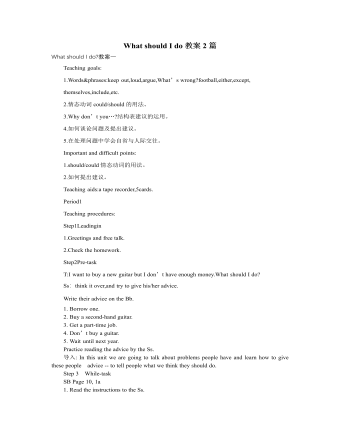
人教版新目标初中英语八年级下册What should I do教案2篇
说明:在帮Li Lei提建议的同时,教育学生如何学好英语。第三课时教学目标1. 语言目标:a) 词汇: Original, in style, haircut, the same as.b) 语言结构:My friend wears the same clothes and has the same haircut as I do.2. 能力目标:大多数学生能够谈论自己喜欢哪种服装,提高查找信息的能力。3. 情感目标:学会如何与朋友相处,要有自己对时尚的看法。教学重点掌握一些重要词汇。教学难点学会谈论问题,并能提出书面建议。◆教学突破首先针对Erin的问题,提出个人的建议,模仿2c部分的对话展开双人交际Pair-work;听老师诵读3a部分的信件,并找出LEFT OUT的问题所在;学生完成3b部分的内容,给Left Out提出书面的建议;学以口头形式提出自己目前存在的某个问题,讲给大家听,让同学们给自己提出一个建议,并作笔录;学生两、三个人分成一组,随意性地进行口语交际,谈论P14的第4部分的某个问题,相互交换意见。

人教版新目标初中英语八年级下册He said I was hard-working教案2篇
This activity introduces some new vocabulary and provide oral practice using the target language.Task 1 . Ask four students to stand in front of the class, and the teacher asks them the following questions as a reporter.1.What are you going to do when you grow up?2.What are you going to do next week?3.What are going to do after school?The students will give different answers, then ask a good student to report what they said.I am going to e a doctor.What did she say?----------She said she was going to be a doctor.I am going to have a party on Friday night.What did he say?-------He said he was going to have a party on Friday night.I am going to do my homework.What did she say ?------ She said she was going to do her homework.I am going home after school.What did she say?-----She said she was going home after school.Say In this unit we are going to learn to use words like to report what someone said.Task 2. Read the instructions. Then ask a student to read the four questions. And write the words on the Bb. Explain what soap opera is.Task 3. Ask the students to Look at the pictures, point out the TV screens in the picture. Ask one girl to read what Marcia said.What did Marcia say? She said She said she was having a surprise party for Lana on Friday night. Repeat the other pictures in the same way.Activity3. Listen and number the pictures in activity 1a.

人教版新目标初中英语九年级下册By the time I got outside, the bus had already left教案
Ⅰ. Teaching Aims and Demands1. Knowledge Objects(1) Key Vocabularyoversleep(2) Target LanguageWhat happened?I overslept. And by the time I got up, my brother had already gotten in the shower.2. Ability Objects(1) Teach the students to use the new words.(2) Train the students to narrate past events with the Past Perfect Tense.(3) Train the students' listening and speaking skills with the target language.3. Moral ObjectIt’s a good habit to go to bed early in the evening and get up early in the morning. So you’ll never be in a hurry in the morning.Ⅱ. Teaching Key Points1. Key Vocabularyoversleep2. Target LanguageNarrate past events with the Past Perfect TenseⅢ. Teaching Difficult Points1. Train the students to narrate past events with the Past Perfect Tense.2. Train the students to understand the target language in spoken conversation.Ⅳ. Teaching Methods1. Thinking of examples from the students' real lives.2. Making sentences by looking at the pictures.Ⅴ. Teaching AidA tape recorderⅥ. Teaching ProceduresStep I Revision1. Revise the language points in Unit 8.Ask some questions like this: What volunteer work would you like to do?Help the students to answer, I’d like to…/I love to…/I hope to2. Practice the dialogue in Activity 3c on page 62 again. Get students to role play the similar dialogues with the following.
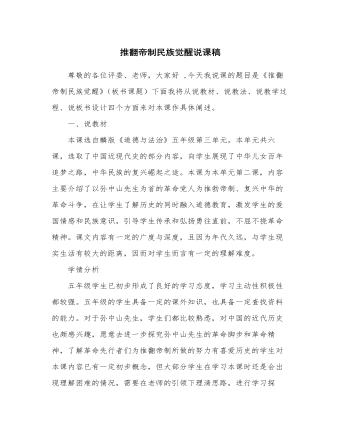
人教部编版道德与法制五年级下册新版推翻帝制民族觉醒说课稿
2、班级交流请小组派代表在班级交流,说说在小组学习中的收获和体会。3、教师总结:孙中山先生一生都在为推翻帝制,推进民主革命,实现中华民族的伟大复兴而努力,他是一位伟大的革命先驱,值待我们每个人的尊敬与怀念。活动三:感受孙中山的革命精神(一)学习名言1、出示孙中山先生的名言,指名学生朗读。2、请学生来说说名言的含义。3、老师帮助解读,引导学生体悟孙中山先生的革命精神。4、请学生结合孙中山先生的伟大精神,说说对自己的学习生活的启示。5、齐读名言。(二)学习链接资料1、出示课文中链接资料,学生默读资料。2、讨论:说说我们国家目前的巨大变化,畅想祖国的美好未来。3、教师小结今日中华民族的伟大复兴与革命先辈们的不断探求救国救民之路,奋勇抗争推翻帝制是分不开的,让我们牢记历史,以孙中山等革命先驱为榜样,为祖国的美好未来努力奋斗!
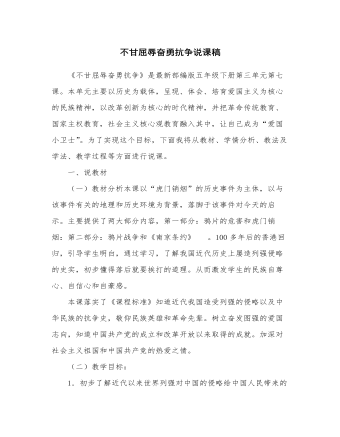
人教部编版道德与法制五年级下册新版不甘屈辱奋勇抗争说课稿
1、同学们,老师这里收到了一位法国大作家雨果的来信,让我一起来听一听。“在世界的一隅,存在着人类的一大奇迹,这个奇迹就是圆明园。圆明园属于幻想艺术。一个近乎超人的民族所能幻想到的一切都荟集于圆明园。只要想象出一种无法描绘的建筑物,一种如同月宫似的仙境,那就是圆明园。假定有一座集人类想象力之大成的宝岛,以宫殿庙宇的形象出现,那就是圆明园。”2、听了雨果的这段话,你脑海中的圆明园是怎么样的?有什么疑问吗?3、但是,这一奇迹现在已荡然无存,留在我们眼前的只有几根残缺的大石柱。它们静静地站在那里,像一座纪念碑,诉说那段屈辱的历史—板书:圆明园的诉说。二、学习新课,体验明理活动一:惊叹圆明园的辉煌师:圆明园是一座皇家园林,现在却只留下这些残垣断壁。那么,你知道圆明园在哪儿吗?你知道多少关于圆明园的故事?
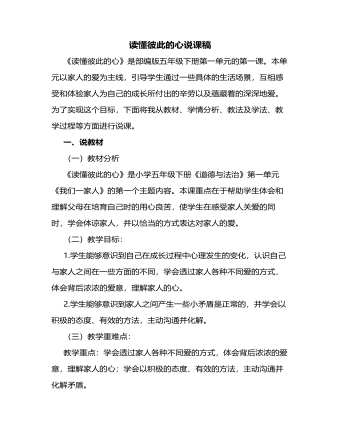
人教部编版道德与法制五年级下册新版读懂彼此的心说课稿
(二)理性面对:交流方式多。1、其实,遇到问题并不可怕,办法总比困难多。2.阅读王玉理的故事,你受到哪些启发?3.交流方式有很多:如写信、留言条等。4.情景出示:班里很多学生都可以用钢笔书写了,由于我写字漏字错字现象多,老师让我再练练,可是妈妈觉得是我写字写得不好。我认为这明明是两个问题,妈妈的误解让我很不开心。如果是你,你会怎么做呢?选择合适的方式,试着主动和妈妈交流沟通吧。(三)我爱家人:发现父母的美。1、小组内合作,阅读课前小调查“我眼中的父母别人眼中的父母”,说说有什么新的发同伴身上学现?2.列举事例说说父母身上的父母的闪光点,交流自己的感受。3.教师总结。(四)拓展延伸:布置活动作业。1.布置课后活动作业。2.小结:明确下节课学习内容。
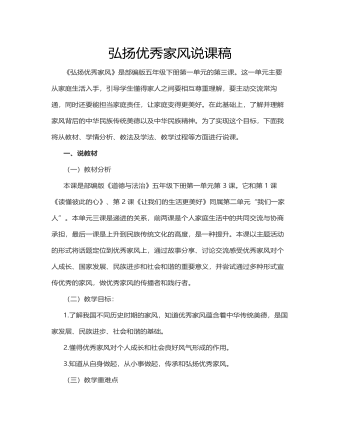
人教部编版道德与法制五年级下册新版弘扬优秀家风说课稿
3.3百年革命家国情怀同学们,我们今天的美好生活,是许多烈士用鲜血换来的。书中摘录了一些仁人志士写给家人的书信。我们一起来读一读,边读边思考,你从中体会到了哪些优秀家风?热爱祖国,报效祖国。教师小结:在培育良好家风方面,先辈们为我们做出了榜样,让我们学习先辈,传承良好家风。4.活动园对长辈做一次访谈,了解家风,并在班中交流分享。(三)教师总结:家庭就像社会中的细胞,每一个小家的幸福共同构建起一个和谐的社会。每一个家庭的优秀家风,汇聚成中华民族的家风。无论时代如何变化,优秀家风都是国家发展、民族进步与社会和谐的基础。作业写作一篇《我的家风故事》,下节课分享讨论。五、说教学设计弘扬优秀家风优秀家风对个人成长、国家发展、民族进步和社会和谐的重要意义

人教部编版道德与法制五年级下册新版建立良好的公共秩序说课稿
教师小结:同学们,通过刚才的讨论,我们明白了只有大家共同遵守规则,才能创造和谐文明的社会环境,正如著名学者莱蒙特所说的:“世界上的一切都必须按照一定的规矩秩序各就各位。”(六)、课堂总结师:通过今天对《建立良好的公共秩序》这一课的学习,我们懂得了什么?在生回答的基础上师进一步谈话:生活中有许多看起来是微不足道的事情,实际上都同社会的主产、生活乃至每个社会成员的工作、学习、生活密不可分,如果一个社会的公共秩序受到了破坏,这个社会的正常生产和生活也就受到极大的影响,社会风气就会颓败,反之如果一个社会的每个成员都学法、懂法、守法、护法,拥有一个良好的公共秩序,那么社会就会有条有理,井然有序,因此建立一个良好的社会公共秩序,是我们大家的迫切希望,希望同学们从我做起,从现在做起,认真遵守公共秩序吧!

人教部编版道德与法制五年级下册新版我们的公共生活说课稿
活动4:1.在你的周围有哪些常见的公共设施?它们各有什么功能?2.我们能为爱护公共设施做些什么?答案:1.常见公共实施:绿地、道路、路灯、地下(上)线路和管道停车场(库)、配电房(室)及电器设备、消防设备、电梯、健身娱乐设施公告牌等。功能:这些设施为人们提供了宜居的优美环境,为人们日常生活提供了方便,维护了人们正常的生活秩序,使人们的公共生活有了安全保障。2.我们要了解各类公共设施的功能和使用方法,爱惜使用各类公共设施,不损坏公共设施;自觉参与维护公共设施的活动,主动护理公共设施3.爱护公共施的做法有哪些?①要了解各类公共设施的功能和使用方法,爱惜使用各类公共设施,不损坏公共设施;②自觉参与维护公共设施的活动,主动护理公共设施。
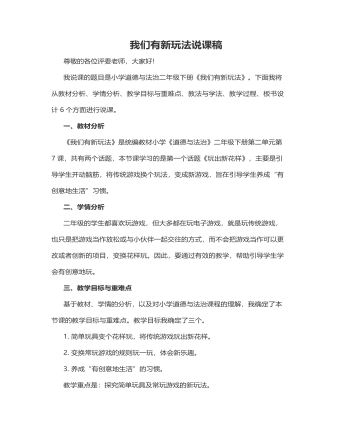
人教部编版道德与法制二年级下册我们有新玩法说课稿
活动三:游戏花样玩乐趣多课件出示儿歌《游戏玩法花样多》,学生自己诵读,再齐读。设计意图:学以致用,进一步感受游戏新玩法带来的快乐。环节三::感悟明理,育情导行学生谈一谈学习本节课的收获,教师相机引导。设计意图:梳理总结,体验收获与成功的喜悦,内化提升学生的认识与情感。环节四:拓展延伸,回归生活课间,和伙伴们一起变换花样玩游戏。设计意图:将课堂所学延伸到学生的日常生活中,有利于落实行为实践。六、板书设计为了突出重点,让学生整体上感知本节课的主要内容,我将以思维导图的形式设计板书:在黑板中上方的中间位置是课题《玩出新花样》,下面左边从上到下是简单玩具变个花样玩,变换游戏伙伴玩,变换玩具组合玩,右面是乐趣。我的说课完毕,谢谢各位评委老师!
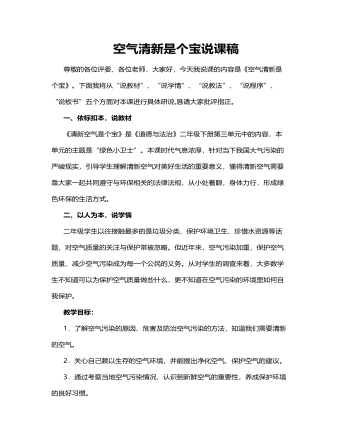
人教部编版道德与法制二年级下册空气清新是个宝说课稿
任务1:同学们,你们在课前调查中发现了哪些污染空气的现象?请将调查结果填写在《空气污染小调查》的表格中。学生活动:学生在全班汇报展示。任务2:从调查结果中我们还发现什么呢?学生活动:学生交流。教师小结:空气污染就在我们身边,大气污染带给我们一定的危害,我们一定要养成保护环境的好习惯。活动四:我能做些什么呢任务1:为防治大气污染,国家、政府做了大量工作,我们也做了很多力所能及的事情。那么,同学们计划怎样保护空气清新呢?学生活动:学生交流(如植树造林、使用新能源产品等、不放鞭炮、敢于举报严重污染大气的行为……)。教师小结:通过本节课的学习,我们知道了保护环境就是保护我们的家园,净化空气就要从身边的小事做起。
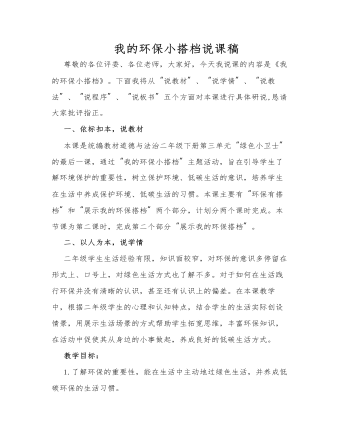
人教部编版道德与法制二年级下册我的环保小搭档说课稿
小结:相信随着科技的进步,会有更多的垃圾变宝贝,看来只要用心发现,动手创造,我们可以利用的环保小搭档可真不少。展示“家庭环保小搭档”环节,从学校生活过渡到家庭生活,以填表的形式降低学生交流难度。口头的交流不足以让学生有清晰的认识,课前已让学生搜集相关内容,通过图片、视频等内容展示分享,让学生对“环保小搭档”有更清晰的认识,在交流分享过程中,努力让学生意识到过有创意的绿色生活的重要性、必要性。活动四:“环保”知多少我们为环保助力的行为既是大家倡导的,也是受到法律保护的,开启环保之旅第四站——科普馆1.出示与环境保护有关的节日2.了解《中华人民共和国环境保护法》拓展补充有关中国及世界上有关环保的节日,同时了解《中华人民共和国环境保护法》。
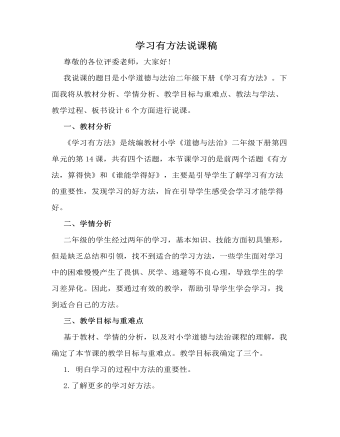
人教部编版道德与法制二年级下册学习有方法说课稿
设计意图:发现身边更多的学习好方法。活动三:巩固学习的好方法课件出示儿歌《学习好方法》,学生填空后,齐读儿歌。设计意图:学以致用,巩固学习的好方法。环节三:感悟明理,育情导行学生谈一谈学习本节课的收获,教师相机引导。设计意图:梳理总结,体验收获与成功的喜悦,内化提升学生的认识与情感。环节四:拓展延伸,回归生活以小组为单位,将各组总结的学习好方法张贴到板报上。设计意图:将课堂所学延伸到学生的日常生活中,有利于落实行为实践。六、板书设计为了突出重点,让学生整体上感知本节课的主要内容,我将以思维导图的形式设计板书:在黑板左面的中间位置是课题《学习有方法》,右面从上到下依次是专心听讲、细心观察、珍惜时间、持之以恒、节约时间。

